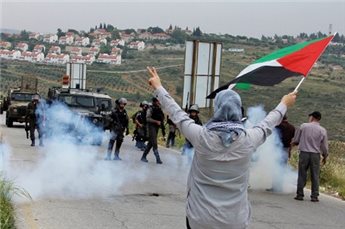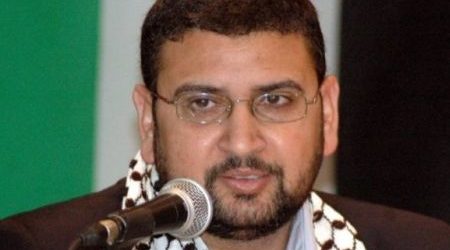PRISONER IN ISRAELI ISOLATION FOR 2 YEARS ‘FORGETS SPEECH’
Gaza, 10 Rabiul Akhir 1434/20 February 2013 (MINA) – A Palestinian man held in solitary confinement by Israel for two years is losing his ability to recall language and has speech impairments, a lawyer who visited him in jail said Sunday.
Dirar Abu Sisi is now losing the ability to recall language, as he spends 23 hours a day in a three square meter cell and is only permitted to leave it for one hour each day, Abu Sisi’s lawyer reported after visiting him yesterday. The prisoners society lawyer said Abu Sisi told him prison guards were implementing other punitive measures.
They bring him rotten food, and recently confiscated his notebook where he records his thoughts during his isolation, Abu Sisi said, according to www.qassam.ps reports monitored by Mi’raj News Agency (MINA), Wednesday.
According to his family, Abu Sisi’ health was already unstable as he suffered from chronic ailments such as heart disease, hypertension, high cholesterol, and anemia and his condition has considerably worsened since he was kidnapped in 2011.
Waed Society for Detainees called on international human rights organizations to act immediately to save the life of Abu Sisi.
Kidnapping
Abu Sisi, an engineer from Gaza who was the director of the Gaza power plant, was kidnapped by Israel while traveling in the Ukraine between Kiev and the eastern city of Kharkov on February 18 2011.
A father of six and married to a Ukranian woman, Abu Sisi had arrived in the Ukraine on January 27 2011 to visit his wife’s family, and to register their children there.
Israeli Intelligence services (Mossad) kidnapped Abu Sisi on February 18 2011 with the help of Ukrainian Intelligence services, and transferred him to Israel in a coffin, without informing the Red Cross.
His wife Veronica said train attendants told her that her husband had been taken away by two men posing as officers of the Ukrainian secret service. A month later, Israel partially lifted a gag order on reporting his disappearance and Abu Sisi turned up in Israeli court.
A week later Abu Sisi appeared in an Israeli court represented by an Israeli lawyer, where the judge ordered his detention in Ashkelon prison.
Israel accused Abu Sisi of helping Palestinian resistance factions to develop missiles. Abu Sisi denies all such accusations.
Solitary Confinement
Israel refused to release Abu Sisi from solitary confinement despite the deal brokered by Egypt in May 2012 which included several terms relating to improving prisoners’ conditions, one of which was the release of all prisoners from solitary confinement.
The order to keep Abu Sisi in isolation was renewed for another six months on Nov. 1, 2012.
The deal brought to an end a mass hunger strike campaign launched by Palestinian prisoners.
Secretive detentions in Israel have come under the spotlight in recent days, after an Australian TV report identified the mysterious ‘Prisoner X’ as Australian citizen Ben Zygier.
Zygier, a possible Mossad operative detained on suspicion of security offenses, was held in isolation and his identity shrouded in secrecy. He committed suicide in Israeli jail in 2010.
According to Palestinians Prisoner Support and Human Rights Association AdDameer, Every year, dozens of Palestinian prisoners and detainees are held in solitary confinement, as a disciplinary measure, or in isolation, for reasons of state, prison or prisoner’s security. An unknown number of detainees who pass through interrogation facilities are held at any given time in isolation.
Solitary confinement and isolation are both measures imposed during a prisoner’s detention or prison sentence. Solitary confinement is facially used by Israel as a disciplinary measure and is also common practice during interrogation, typically employed immediately following arrest. Solitary confinement combined with a monetary fine is the most common punishment taken against Palestinians held in Israeli prisons.
Detainees and prisoners held in solitary confinement are completely cut off from the world. They are held in an empty cell containing only a mattress and a blanket. Other than their clothes, they are not allowed to take anything with them into solitary confinement, including reading materials, a television or radio set.
The detainee or prisoner is held in their solitary confinement cell, which does not contain a toilet, 24 hours a day. When the detainee or prisoner wishes to use the toilet he or she must call out for a guard and wait until one agrees to take the prisoner out.
With regards to persons in prison custody, at the end of September 2012, there were approximately 60 prisoners held in isolation, including 2 that were held in isolation for reasons of state or prison security.
A main demand of Palestinian prisoners’ mass hunger strike in April 2012 was for Israel to end its policy of long-term isolation for “security” reasons. Following the conclusion of the hunger strike, Israel agreed to remove 18 out of 19 prisoners from long-term isolation, though one prisoner was kept in isolation and an additional prisoner received a new isolation order.
Although rules exist under Israeli and international law to closely govern the use of solitary confinement and isolation, both measures are often used impermissibly and at great cost to Palestinian prisoners and detainees.
Prisoners held in isolation are held in a cell alone or with one other prisoner for 23 hours a day. They are allowed to leave their cell for a daily one hour solitary walk; on the way to their walk, the prisoners’ hands and feet are typically shackled.
Handcuffs may sometimes be removed, but prisoners report that, in many cases, they remained handcuffed and sometimes even leg shackled during the walk. During every transfer from the isolation cell, including for attorney visits, the prisoner’s hands and feet are shackled, and he or she is accompanied by a prison officer.
Isolation cells in the various Israeli prisons are similar in size – typically from 1.5 by 2 meters to 3 by 3.5 meters. Each cell usually has one window measuring about 50cm by 100cm, which in most cases does not allow in sufficient light or air from the outside.
Isolation cells also include a toilet and shower; prisoners typically hang a curtain to separate the toilet and shower area from the rest of the cell. The cell usually has an iron door, which includes an opening at its lower part, through which guards insert food trays.
Prisoners held in these cells are thus prevented from having any eye contact with other prisoners in the isolation wing or even with guards. In a few prisons only, the doors of isolation cells are made of iron grid, allowing eye contact to be maintained. (T/P02/E1)
|
Statistics |
||||||||||||||||||||||||||||
|
|
Mi’raj News Agency (MINA)






